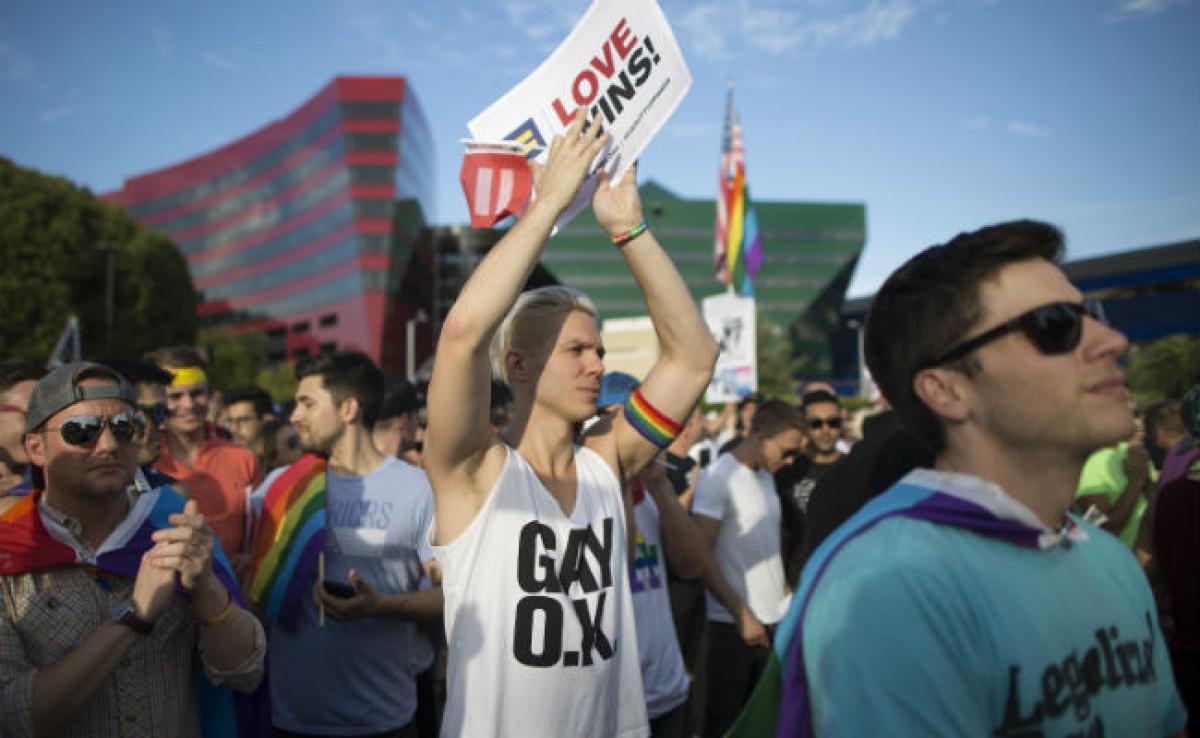Live
- 3 elephants electrocuted in Sambalpur
- Elevate Your Style: Handpicked Luxury Fashion & Accessories
- Ola Electric users continue to cry amid poor service, software glitches nationwide
- Panchayat Raj AE Panduranga Rao caught by ACB while taking a bribe of Rs 50,000.
- Leveraging Data and Analytics for Product Management Excellence: Mahesh Deshpande’s Approach
- Two vegetable varieties of Himachal varsity get national recognition
- Border-Gavaskar Trophy 2023-25: Bowling coach Morne Morkel says Mohammed Siraj is a legend, has a big heart and aggressive mindset
- Michael Vaughan Questions India's Decision to Skip Warm-Up Match Before Border-Gavaskar Trophy
- Rizwan Rested for Final T20I: Agha to Lead Pakistan in Hobart
- Man kills mother-in-law, injures wife and sister-in-law in J&K's Udhampur
Just In

x
Highlights
Gay marriage may now be legal across the United States, but that doesn\'t mean people won\'t get fired if their boss sees the wedding photos.
Gay marriage may now be legal across the United States, but that doesn't mean people won't get fired if their boss sees the wedding photos.

A week after celebrating a landmark Supreme Court ruling overturning same-sex marriage bans in 13 states, activists are gearing up for the next stage of a decades-long battle for equal rights.
"There's a lot of work that remains," said Sarah McBride, researcher at the Center for American Progress.
Less than half of US states have laws protecting people from discrimination based on sexual orientation.
Which means that more than 50 years after the Civil Rights Act outlawed segregated lunch counters, a Tennessee hardware store owner had every right to post a sign in his window declaring "no gays allowed" on Monday.
"It's heartbreaking and it's completely shocking to folks that in a lot of instances and in a lot of places this is legal," Ms McBride told AFP.
That type of overt bigotry is relatively rare because it is becoming socially unacceptable, said Ms McBride, an expert in lesbian, gay, bisexual and transgender (LGBT) issues.
Instead, the political rhetoric has been focused on protecting the religious freedom of business owners and government workers who don't want to serve gay couples.
'That can't last'
The governors of Louisiana and Texas were among a number of officials who told clerks and judges that an army of lawyers stood at the ready to fight for them - for free - if they felt that handing out marriage licenses or presiding over same-sex weddings infringed on their religious beliefs.
A smattering of counties across the Bible Belt initially refused to provide same-sex marriage licenses on religious grounds in the wake of the Supreme Court's June 26 ruling, but by week's end most had relented.
"The backlash just consists of flagrant disobedience to the law. That can't last," said Andrew Koppelman, a law professor at Northwestern University.
"There were some states that tried to defy school desegregation and that didn't last."
The religious freedom laws currently on the books in 21 states do not grant the right to discriminate, said Douglas Laycock, a law professor at the University of Virginia.
It is still up to a judge to weigh whether there is a "compelling interest" that would justify not accommodating religious practices, he explained, and so far only religious non-profits have been granted exemptions from discrimination laws.
Of course, that doesn't help people living in states like Michigan, where a pediatrician recently - and legally - refused to treat a lesbian couple's baby.
"The way forward is to enact gay rights laws with religious exemptions, but that might be politically impossible," Laycock said in a telephone interview.
"The Republicans, especially in red states, don't want the gay rights law and the gay rights side doesn't want the religious exemptions."
'Pure idiocy'
Rights activists hope the firestorm that erupted in March when Indiana enacted a religious freedom law seen to target homosexuals represents a major legislative shift.
Companies like Apple - whose chief executive Tim Cook is openly gay - Levi's and Yelp threatened boycotts and issued strong rebukes, with the president of hotel giant Marriott, Arne Sorenson, blasting the law as "pure idiocy from a business perspective."
The Republican-dominated Indiana legislature caved to the pressure and passed a second law specifically forbidding discrimination based on sexual orientation or gender.
There has also been progress at the federal level despite the lack of explicit protection from discrimination based on sexual orientation.
The Equal Employment Opportunity Commission began prosecuting the cases of people fired for being gay, lesbian, bisexual or transgender in 2012, using a convoluted argument that it falls under the recognized category of sex discrimination because they were targeted for failing to conform to gender stereotypes.
A lesbian fired from an Iowa casino after ten years as a marketing manager used that argument to sue for wrongful dismissal because her boss repeatedly told her to wear more feminine clothes.
The lack of explicit protection and a political climate in which homophobia is masked as religious expression encourages discrimination, said Jennifer Pizer, director of the law and policy at rights group Lambda Legal.
"People lose jobs because the manager or the boss believes they can fire the people with impunity," she told AFP.
"Lots of people may find it impractical to litigate. That's a reality."

Next Story
More Stories
ADVERTISEMENT
© 2024 Hyderabad Media House Limited/The Hans India. All rights reserved. Powered by hocalwire.com







